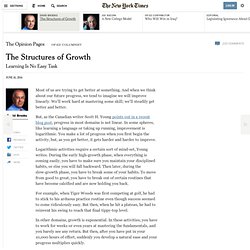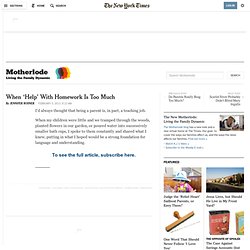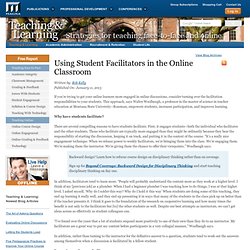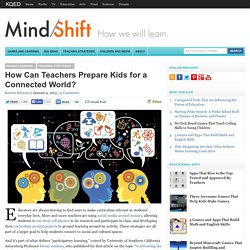

David-brooks-learning-is-no-easy-task. Most of us are trying to get better at something.

And when we think about our future progress, we tend to imagine we will improve linearly. We’ll work hard at mastering some skill; we’ll steadily get better and better. But, as the Canadian writer Scott H. Young points out in a recent blog post, progress in most domains is not linear. In some spheres, like learning a language or taking up running, improvement is logarithmic. Logarithmic activities require a certain sort of mind-set, Young writes. For example, when Tiger Woods was first competing at golf, he had to stick to his arduous practice routine even though success seemed to come ridiculously easy.
In other domains, growth is exponential. Mastering an academic discipline is an exponential domain. Many people quit exponential activities in the early phases. I could think of some other growth structures. Yet other domains follow a valley-shaped curve. Finally, this focus on growth structures takes your eyes off yourself. When 'Help' With Homework Is Too Much. I’d always thought that being a parent is, in part, a teaching job.

When my children were little and we tramped through the woods, planted flowers in our garden, or poured water into successively smaller bath cups, I spoke to them constantly and shared what I knew, putting in what I hoped would be a strong foundation for language and understanding. When my children grew to be school-aged, with homework in the afternoons, I was “on call” to clarify or think through their assignments with them. Sometimes, the teachable moment was one that my children needed to figure out on their own – a process crucial for learning and for confidence-building. Other times, I identified a need for more substantive support and provided it. I didn’t consider this help cheating in any way – but one of my daughter’s teachers did.
My sixth grader came home with an assignment that was out of her grasp: compare the theories of John Locke and Thomas Hobbes in their understanding of human nature and government. The Must-Have EdTech Cheat Sheet. Explania: A Useful Source For Free Educational Videos 2.86K Views 0 Likes Whether or not you prescribe to the idea that there are different types of learners there are some scenarios in which a visual explanation is extremely helpful in understanding the subject matter at hand.
Using Student Facilitators in the Online Classroom. Written by: Rob KellyPublished On: January 11, 2013 If you’re trying to get your online learners more engaged in online discussions, consider turning over the facilitation responsibilities to your students.

This approach, says Walter Woolbaugh, a professor in the master of science in teacher education at Montana State University–Bozeman, empowers students, increases participation, and improves learning. Why have students facilitate? There are several compelling reasons to have students facilitate. First, it engages students—both the individual who facilitates and the other students. In addition, facilitators tend to learn more. “I’ve found over the years that a lot of students respond more positively to one of their own than they do to an instructor.
In addition, rather than turning to the instructor for the definitive answer to a question, students tend to work out the answers among themselves when a discussion is facilitated by a fellow student. How Can Teachers Prepare Kids for a Connected World? Educators are always striving to find ways to make curriculum relevant in students’ everyday lives.

More and more teachers are using social media around lessons, allowing students to use their cell phones to do research and participate in class, and developing their curriculum around projects to ground learning around an activity. These strategies are all part of a larger goal to help students connect to social and cultural spaces. And it’s part of what defines “participatory learning,” coined by University of Southern California Annenberg Professor Henry Jenkins, who published his first article on the topic “Confronting the Challenges of Participatory Culture,” in 2006. His work sprang out of the desire to understand the grassroots nature of creativity, how projects are being shared online and what an increasingly networked culture looks like. “PLAY describes a mode of experimentation, of testing materials, trying out new solutions, exploring new horizons,” Jenkins said. Related.